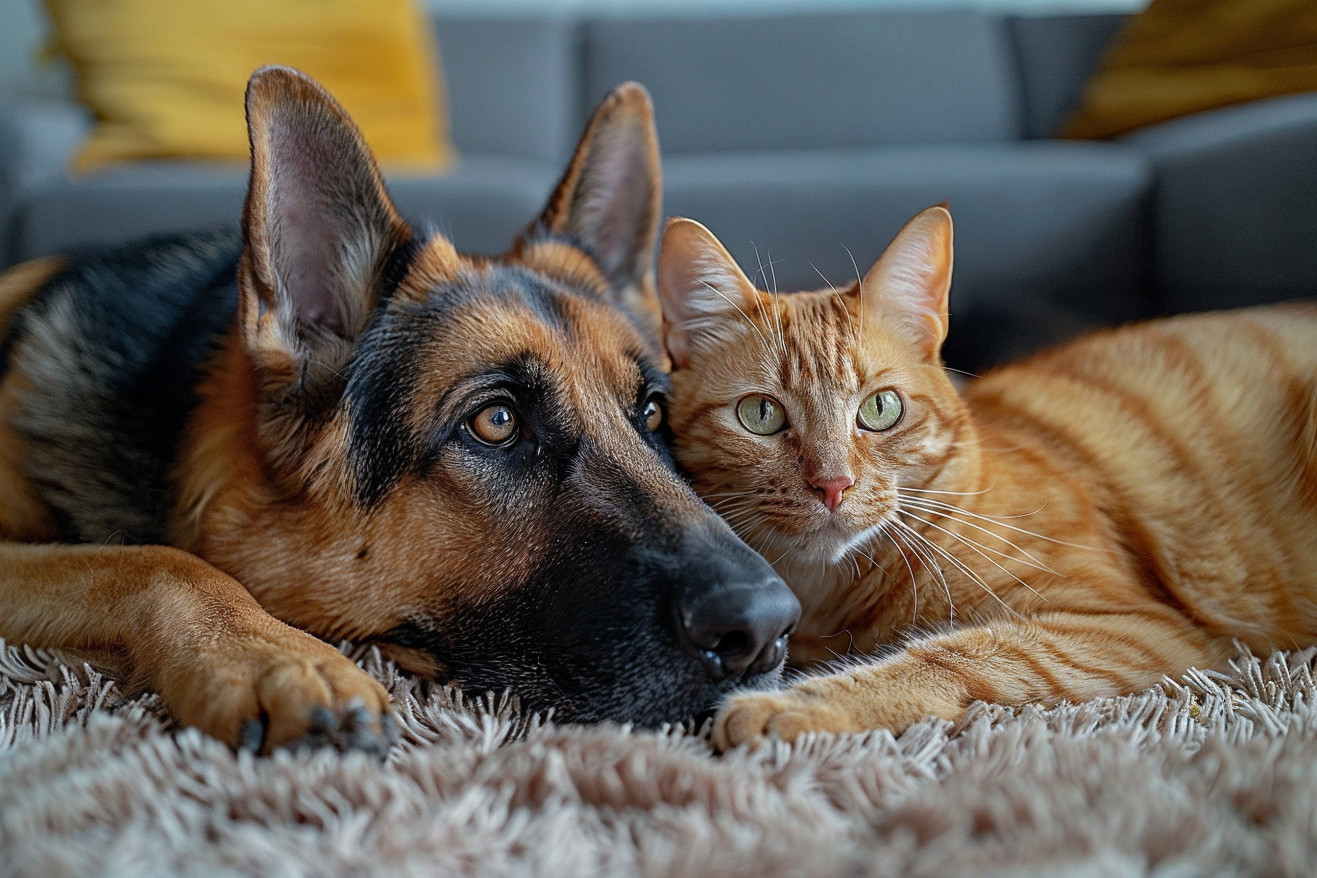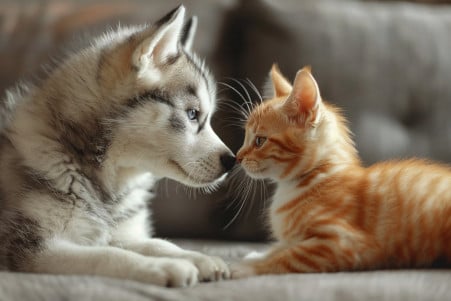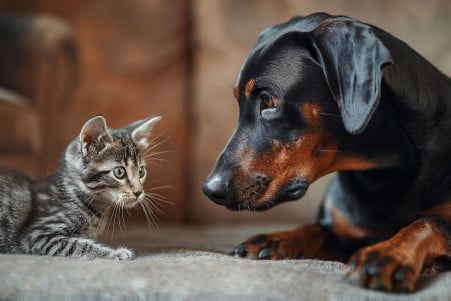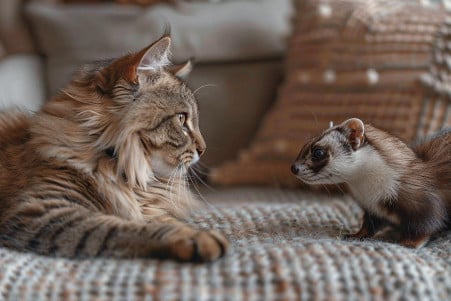German Shepherds and Cats: How to Make It Work
23 March 2024 • Updated 22 March 2024

German Shepherds can be wonderful pets for cats, but their herding background and high energy levels mean that training and socialization are important when it comes to living in a multi-pet household. Although German Shepherds were originally bred to herd and protect flocks of sheep, they can be trained to accept cats as members of their pack rather than prey if they are socialized and trained properly. This is especially true if they are exposed to cats at a young age.
To take a deep dive into whether German Shepherds can live with cats, we will look at studies by animal behaviorists and dog training and breed experts. We will also discuss socialization research to determine the best ways to set these highly intelligent dogs up for success in a multi-pet home. By learning about the needs and behaviors of cats and German Shepherds, you can make sure that you introduce them in a way that works and that you set up a peaceful, loving home.
Are German Shepherds good with cats?
German Shepherd Instincts and Traits
German Shepherds' history as herding dogs has led to a strong prey drive and herding and protective instincts that can make it difficult to integrate them with cats, according to research cited by Timberwolf Pet. This background can make it more likely that German Shepherds will see cats as something to chase or protect against rather than a member of the family.
The breed's strong prey drive is one of the most important factors to consider when living with cats, as Hepper points out. Even if they don't mean any harm, a German Shepherd's herding instincts can look like aggression and be threatening to a cat. This is why it's so important to socialize German Shepherds with cats from a young age and make sure they learn to accept them, something that GSD Colony says is important.
Consistent, positive reinforcement training is also important to make sure that the dog learns to exhibit calm behavior around cats. As Hepper explains, this can include giving the dog treats and praise when they're near the cat and staying calm. That said, dogs' personalities can differ, and some German Shepherds may be more accepting of cats than others, especially those with strong prey drives.
Gradual Acclimation and Training Methods
Because of the German Shepherd's strong prey drive and territorial instincts, the process of introducing a German Shepherd to a cat will need to be slow and methodical to ensure a safe and successful outcome. As Wag! explains, it's important to keep the animals separated at first and let them get used to each other's smells before moving on to controlled, supervised interactions. The American Kennel Club suggests using a baby gate or screen door for these interactions, which will allow the animals to see and smell each other without the risk of physical confrontation.
Positive reinforcement will be important throughout this process. Giving the dog treats and praise when it's in the presence of the cat and remains calm will help reinforce the behavior you want to see, according to Wag!. In addition, basic obedience training commands such as "sit," "stay," and "leave it" can be helpful in controlling the dog's behavior and preventing it from chasing or attacking the cat.
Even after the dog and cat have been successfully introduced, it will be important to continue to be patient, consistent, and vigilant in your supervision, according to Rover.com. With time, patience, and positive reinforcement, the dog and cat can learn to live together peacefully, but it will be important to continue to monitor the situation and be prepared to step in if any issues arise.
Dealing With Behavior Problems and Potential Issues
Some of the most common problem behaviors that can arise when a German Shepherd and cat are living in the same home include chasing, herding, and aggression. As Comfort Zone explains, the German Shepherd's high prey drive and strong herding instincts can cause them to see cats as something to be herded or chased or even as a threat to be protected against, especially since the German Shepherd is so much larger and stronger than the average house cat.
To help control these behaviors, Comfort Zone suggests using obedience commands like "stay", "sit", and "leave it" to redirect the dog's attention away from the cat. They also recommend making sure the cat has plenty of escape routes, such as cat trees, condos, and high shelves, that they can use to get away from the dog when they need to. However, as Wag! warns, it's important to remember that even when the dog is playing, their size and strength can make their interactions with the cat dangerous, so close supervision is a must.
It's also important to be aware of signs of stress and aggression in both animals, including growling, hissing, and staring. If these behaviors can't be controlled with training and environmental modifications, it may be necessary to work with a professional dog trainer or animal behaviorist or even to find a new home for one of the pets, as Quora points out. In the end, the safety and well-being of both animals should be the most important consideration.
How to Tell If a German Shepherd Will Get Along With a Cat
It’s important to assess the temperaments of the individual German Shepherd and cat to determine compatibility, according to Purina. Some signs that a German Shepherd will be a good fit for a home with cats include a calm and confident personality and a willingness to be trained, says Stayyy.com.
In addition to temperament, a German Shepherd’s age, history of socialization, and past experiences can also play a role in whether or not they will be able to accept a cat, notes Stayyy.com. It’s important to closely monitor and assess the two animals during the introduction process to make sure that they are compatible. As German Shepherd Now warns, a German Shepherd’s size and prey drive can make them dangerous to a cat if they are not a good match.
If you have any doubts about whether or not a German Shepherd will be able to get along with a cat, it’s best to work with a professional dog trainer or animal behaviorist. They can help you evaluate the specific animals in question and determine the best way to introduce them.
How to Keep the Peace in a Multi-Pet Home
To keep the peace between a German Shepherd and a cat, it's important to make sure that each animal has their own resources and space. This means, as the American Kennel Club explains, that you should have separate food and water dishes, beds, and litter boxes to avoid any potential issues that could arise from sharing. You may also want to consider using baby gates or crates to create physical barriers that can help manage the situation and prevent any potential problems.
It's also important to make sure that your German Shepherd is getting enough exercise and mental stimulation to keep them from getting bored and acting out in ways that could be problematic for your cat. Rover.com recommends making sure that you're playing with and training your dog to keep their mind engaged and to keep them from focusing on the cat.
You can also help your pets get along by creating positive associations between them, such as by swapping their bedding or toys so that they can get used to each other's scents, as suggested by the American Kennel Club. You can also reward your pets with treats when they interact calmly to help encourage the behavior. Finally, make sure that you're keeping your household as calm and predictable as possible to help reduce the chances of any conflicts.
Conclusion: German Shepherds and Cats Can Live Together Peacefully
German Shepherds and cats can live together successfully if the right steps are taken. This includes understanding the needs and behaviors of each animal and socializing and training the German Shepherd to accept the cat as a family member rather than a potential victim.
By following a plan that includes a slow introduction, positive reinforcement, and careful management of the home environment, many German Shepherds can live with cats. While there are no guarantees due to individual differences, the potential for a successful and rewarding multi-pet household is high when the right measures are put in place.
That said, it’s important to carefully evaluate the animals involved and, if necessary, seek professional help. With time and effort, German Shepherd owners can create a situation in which both dogs and cats can be happy and healthy members of the family.


